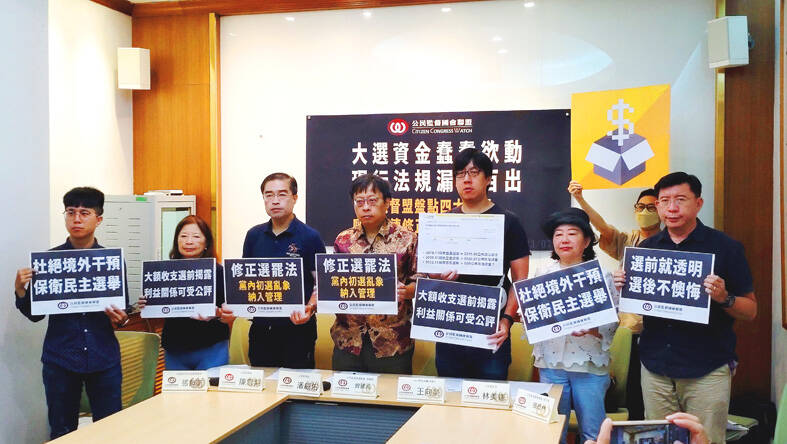Citizen Congress Watch yesterday urged amendments to the Political Donations Act (政治獻金法) to prevent election interference and increase the transparency of cash flows during campaign periods.
The legislative watchdog proposed four amendments, calling on the legislature to make the changes by the end of the upcoming legislative session, which is to run until December, as campaigns for the presidential and legislative elections on Jan. 13 next year have started.
Political donations related to primary elections held by political parties should be regulated by the act, the group said.

Photo: Yang Cheng-yu, Taipei Times
Regulations regarding leaders of recall campaigns and leaders facing a recall should be also included, it said.
Primary elections and recall campaigns are not regulated by the act, which is problematic as it provides opportunities for illegal funds to intervene, Citizen Congress Watch executive director Leo Chang (張宏林) said.
The act is not thorough enough to prevent Chinese funding to from interfering in elections, the group said.
Political donations should be disclosed before the election, instead of up to nine months after the election according to the current act, it said.
Any expense over NT$100,000 should be revealed within two weeks, the group said, calling on candidates to voluntarily disclose income of more than NT$100,000 and expenses of more than NT$50,000 before the amendments are passed.
Citizen Congress Watch chairman Tseng Chien-yuan (曾建元) said that the act is too narrow in scope, so many donations are not regulated.
To avoid public scrutiny, large political donations are often made in China or other countries to avoid records of transactions in Taiwan, he said.
China’s obvious intention to influence Taiwan’s elections, often through incentives such as campaign funds, makes the issue extremely problematic, he added.
No Chinese individual, juristic person, organization or other institution has been punished under the act since the Anti-Infiltration Act (反滲透法) was promulgated more than three years ago, which is hard to believe, Chang said.
Regulations have been ineffective, as there have been many reports of attempts by foreign forces to interfere in Taiwan’s elections, he said.
Many institutions at home and abroad have warned that China would increase its interference in elections, but the regulations regarding election funds are insufficient, he said.
Regulations on political donations should be treated seriously by political parties, as they are related to Taiwan’s national security and election climate, he said.

A preclearance service to facilitate entry for people traveling to select airports in Japan would be available from Thursday next week to Feb. 25 at Taiwan Taoyuan International Airport, Taoyuan International Airport Corp (TIAC) said on Tuesday. The service was first made available to Taiwanese travelers throughout the winter vacation of 2024 and during the Lunar New Year holiday. In addition to flights to the Japanese cities of Hakodate, Asahikawa, Akita, Sendai, Niigata, Okayama, Takamatsu, Kumamoto and Kagoshima, the service would be available to travelers to Kobe and Oita. The service can be accessed by passengers of 15 flight routes operated by

Chinese spouse and influencer Guan Guan’s (關關) residency permit has been revoked for repeatedly posting pro-China videos that threaten national security, the National Immigration Agency confirmed today. Guan Guan has said many controversial statements in her videos posted to Douyin (抖音), including “the red flag will soon be painted all over Taiwan” and “Taiwan is an inseparable part of China,” and expressing hope for expedited reunification. The agency last year received multiple reports alleging that Guan Guan had advocated for armed reunification. After verifying the reports, the agency last month issued a notice requiring her to appear and explain her actions. Guan

GIVE AND TAKE: Blood demand continues to rise each year, while fewer young donors are available due to the nation’s falling birthrate, a doctor said Blood donors can redeem points earned from donations to obtain limited edition Formosan black bear travel mugs, the Kaohsiung Blood Center said yesterday, as it announced a goal of stocking 20,000 units of blood prior to the Lunar New Year. The last month of the lunar year is National Blood Donation Month, when local centers seek to stockpile blood for use during the Lunar New Year holiday. The blood demand in southern Taiwan — including Tainan and Kaohsiung, as well as Chiayi, Pingtung, Penghu and Taitung counties — is about 2,000 units per day, the center said. The donation campaign aims to boost

The Central Weather Administration (CWA) said a magnitude 4.9 earthquake that struck off the coast of eastern Taiwan yesterday was an independent event and part of a stress-adjustment process. The earthquake occurred at 4:47pm, with its epicenter at sea about 45.4km south of Yilan County Hall at a depth of 5.9km, the CWA said. The quake's intensity, which gauges the actual effects of a temblor, was highest in several townships in Yilan and neighboring Hualien County, where it measured 4 on Taiwan's seven-tier intensity scale, the CWA said. Lin Po-yu (林柏佑), a division chief at the CWA's Seismological Center, told a news conference